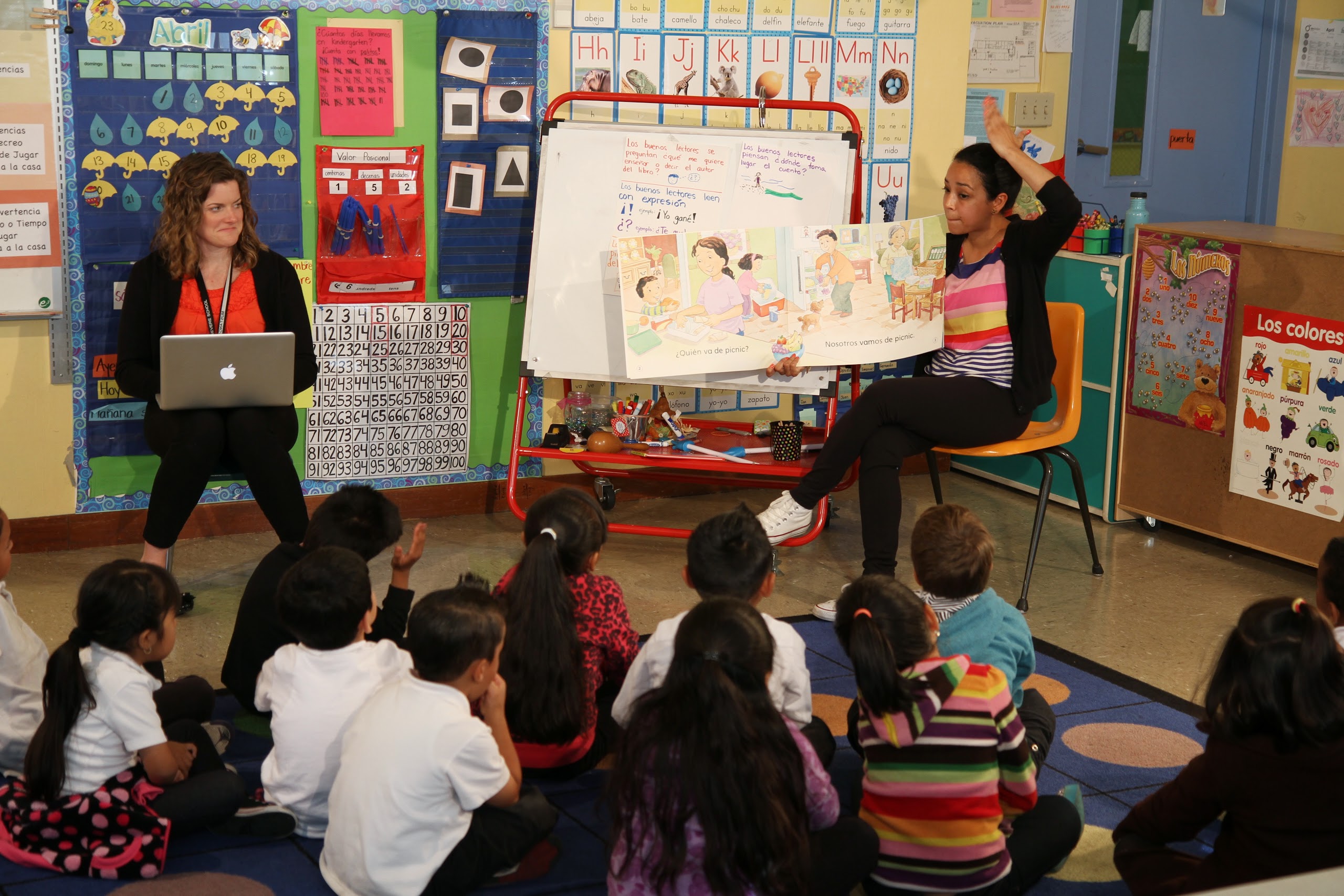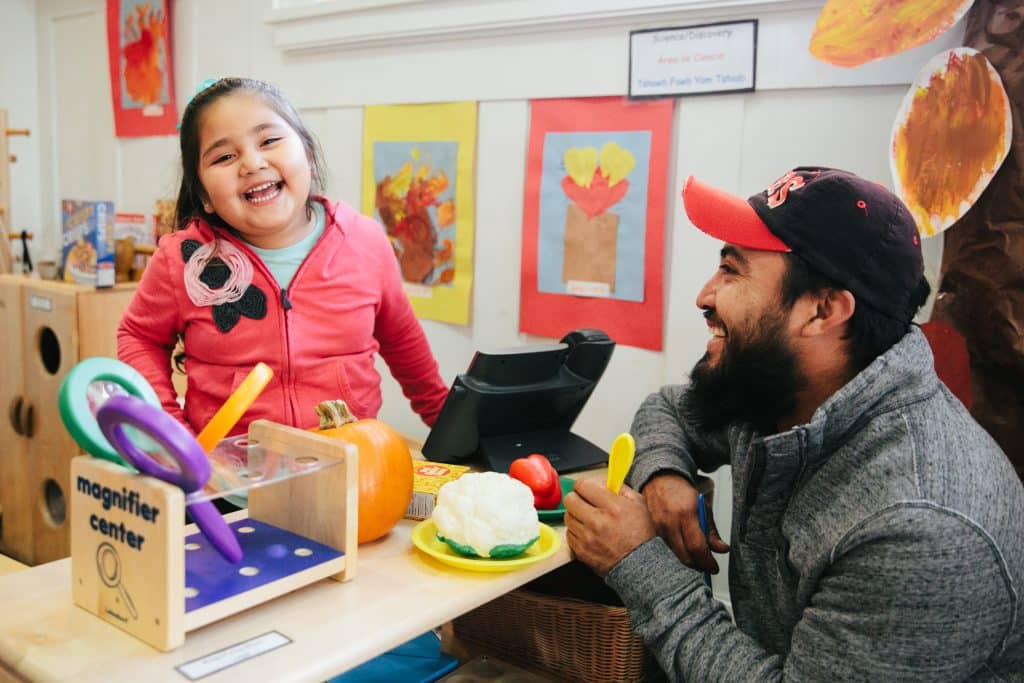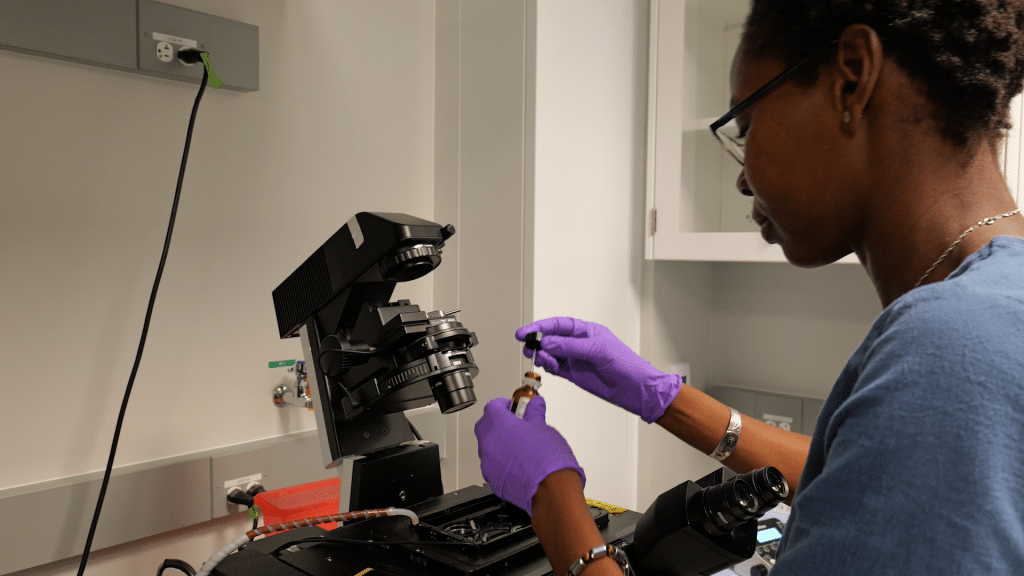Jenna Wachtel, program director for early learning at New Teacher Center, has a vision for classrooms of young children across California:
“Teachers are well supported. They come to work happy, curious, excited, and engaged. They are eager to look carefully at kids’ strengths, needs, and interests to plan for intentional instruction.” Because of it, “kids are excited and engaged. They feel happy and safe at school interacting with each other and with adults. They are ready to thrive in school and beyond, and families see that and feel empowered to support their children’s journey.”
New Teacher Center, or NTC, is a national organization that is improving student learning by making new teachers, experienced teachers, and school leaders in all grade levels more effective. They are partnering with California communities to bring professional development to the teachers of three, four, and five-year-olds because, as Wachtel describes, “if we want them to do well in kindergarten and beyond, we need to start by supporting our children and their families from the second they enter the classroom.”
And after 29 years of teaching young children, preschool teacher with Oakland Unified School District Jacquetta Wallace has seen it happen. “When we give kids a positive beginning, a great start,” she says, “it will follow them throughout their life.”
New Teacher Center is improving student learning by making new teachers, experienced teachers, and school leaders in all grade levels more effective.
Coaching by and for Teachers
Wachtel started her career as a kindergarten and first grade teacher. “I wanted to be a teacher for social justice reasons. I wanted to be effective at empowering children with the skills and dispositions they need to become the next generation of leaders,” she says. “But the realities of the classroom hit me hard, and I didn’t know how to meet all those needs by myself.”
To succeed in the often-unpredictable world of early education, Wachtel, like many teachers, credits the mentors, coaches, and other teachers around her. “Because I had great support, I was able to work through challenges, develop resilience,” she recalled. “I learned to start with what was working, reflect on what could be improved, and get the answers I needed.”
A culture of coaching, training, and peer support is at the core of the NTC’s work. For more than two decades, NTC has partnered with school districts, policymakers, and leaders across the country to help educators at all levels improve. In the 2015–2016 school year alone, NTC supported more than 7,500 mentors and coaches. Those coaches helped over 40,000 teachers to reach 3.4 million students in school districts across the country. Studies have demonstrated that teachers who work with NTC coaches are more effective at engaging and teaching students, and that their students show significant math and reading gains in the classroom.
The Packard Foundation saw an opportunity to bring NTC’s K–12 coaching to a whole new set of teachers: those that teach children before Kindergarten.
Some of the best people to help the next generation of educators develop quality teaching skills are quality teachers themselves.
As national attention on the importance of early childhood education increases, people are shifting focus from solely testing to what quality teaching looks like in practice. NTC believes that the best people to help the next generation of educators develop quality teaching skills are quality teachers themselves.
NTC began its work with early educators in preschool and transitional kindergarten classrooms across California, including in the three Starting Smart and Strong communities in Fresno, Oakland, and San Jose. In each of these communities, public and private partners are working together with the support of the Packard Foundation to test new ways to help all adults better support our youngest learners, and scale what works.
NTC is making professional development resources available to new and experienced teachers in these and other communities across the state. It provides courses and group activities to teach new and proven methods, and instructional coaching to help teachers implement what they are learning. In each community, NTC coaches are responding to the unique needs of local teachers.
Fresno: Building a Professional Learning Community
The Fresno Unified School District’s mission for early learning is to ensure all children “have an equitable start for college, career, and life readiness.” To do so, it “provides nurturing, child-centered environments and high-quality educational programs that value and respect the needs, languages, and cultures of all students, families, staff, and community.”
To make its mission a reality, NTC is helping cultivate and train teachers to lead professional learning communities across the district’s 59 sites.
In professional learning communities, teachers are able to learn from each other, share their experiences, and grow as professionals.
“Our teachers have been asking for years to collaborate with their colleagues,” explains Katy Madden, a Program Manager in the district’s Early Learning Department. “They want support and encouragement from one another; [they want] to brainstorm ideas.”
This fall, 15 preschool teachers across the district have committed to becoming Lead Teachers. The teachers meet regularly with NTC leaders for professional development training. They then bring what they’ve learned to small groups of fellow teachers. This work is building a collection of professional learning communities where teachers share their experiences, learn from each other, and grow as professionals.
Supporting teachers is the groundwork that will allow the district to achieve its mission, explains Madden. It’s “the foundation so that all kids have the equitable start that helps them be successful.”
Oakland: Teachers Taking the Lead
Jacquetta Wallace’s passion, she says, “is with the little ones.” Wallace has been teaching preschool and pre-k with Oakland Unified School District for nearly 30 years. With support from Nicole, her NTC mentor, Wallace is bringing her experience and thirst to learn more to her role as a Teacher Leader, offering support to new and incoming teachers at her school.
“When teachers are feeling comfortable and empowered, they bring it to their classroom,” says Wallace. “And if they don’t have that support, if they’re feeling frustrated or worried, they bring that negative energy to their classroom and teaching just the same. I want to make sure [teachers] have that empowerment so it can translate to their classroom.”
Unfortunately, explains Wallace, many new teachers “don’t get the support they need from the district.” They just put them straight in the classroom.
That’s where Wallace comes in. She supports new teachers during their first year in everything from “classroom management and classroom setup,” to “how to engage with parents—just supporting them on whatever they need at the time.”
Ultimately, her goal is to “empower new teachers and make their transition as easy and as comfortable as possible.”
She’s growing herself, and becoming a better leader. Through NTC’s professional development classes, she is able to learn more about early education theories and practices that she’s interested in and coach other educators.
“In the past, I would never get up and present anything,” Wallace says. “But now, I’ve been part of teacher leadership, did a legacy project; I’ve participated in three or four professional development [sessions] now; I’ve done a video with fellow teacher leaders. With [Nicole’s] support, she has helped me come out of my comfort zone and do things I’d never have done before.”
After a year of Wallace’s coaching, how are the new teachers doing? “All the classrooms are thriving,” she says.
Coaches work one-on-one with teachers to apply what they’ve learned to their unique classroom.
Building Skills and Strengthening a Field
Wachtel, the NTC program director, herself had a mentor from the NTC. “I know personally the profound effect a high-quality mentor or coach can have. When my colleagues are in classrooms, I know what impact we can have on kids,” she says. “And that’s the impact we can have on society at large.”
In Fresno, Oakland, and beyond, early education professionals are sharing what they’re learning in order to achieve this impact across California. When teachers have access to professional development through a partnership with NTC, they learn from seasoned peers and bring new research-based, classroom-tested practices to their classrooms. They continue to grow, thrive, and give their best to their students in an ever-changing field.
These communities are also modeling what quality early learning looks like, and creating an infrastructure that other classrooms and communities can replicate. With this example in hand, educators across California will be able to expand opportunities for teachers to gain the skills and experience they seek to create positive learning environments. When teachers are prepared, students receive an education that prepares them to be better learners in kindergarten and beyond.
These communities are modeling what quality early learning looks like.
“We really do feel so grateful to be a part of this work,” Wachtel says. “We know the impact that is possible when we support teachers, and we’re learning so much working with these district partners and other partners in the field as we dive deep into early learning,” Wachtel says. “We stand on the shoulders of some truly amazing early learning educators. In some ways I feel like we’ve been doing this work a long time, but in other ways, we’re just at the beginning.”







